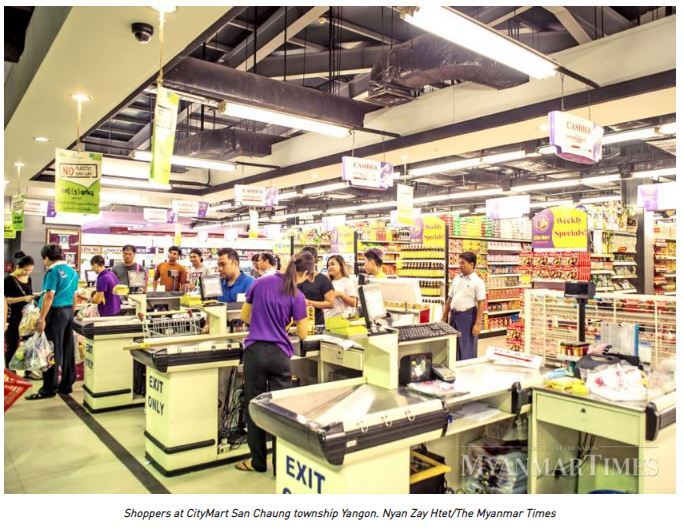Myanmar: Locals call for more regulation in retail sector
As foreign retailers enter the domestic market, the government should work to ensure a level playing field, said local retailers.
During the Private Sector Development Committee meeting with President U Myint Swe on April 27, Daw Su Hlaing , Secretry of Myanmar Retailers Association, voiced concern for the survival of local retailers in the face of foreign competition.
She said the government should have a plan to protect local retailers before allowing foreign companies to compete in the market, adding that local companies face challenges such as a lack of funds, high interest rates and expensive rental, making it hard for them stay profitable.
In comparison, foreign retailers enjoy many incentives under the Myanmar Investment Law that make it easier for them to do business in the country, she said.
At the meeting, U Phyo Min Thein, Yangon Region Chief Minister, said: “Local businesses worry about the government allowing foreign companies to do business here. But they should not be fearful as they have a better understanding of Myanmar markets and culture.”
This comes after the Ministry of Commerce announced a list of 11 local and foreign companies that will be allowed to operate retail and wholesale businesses in Myanmar on April 3.
Among those on the list, DKSH, which is wholly foreign-owned company, has been granted permission to retail and distribute wholesale foods, household utensils, medicines and medical products, hospital equipment, animal foods and medicines, industrial chemicals, and machines and other goods.
Local retailers are claiming the government is creating opportunities for foreign companies that could put local companies at a disadvantage.
“We welcome foreign companies as their entry will help develop the whole retail market and the country’s economy. However, as the competition becomes fiercer, the country would make better progress if there is regulatory oversight to ensure a level playing field,” said City Mart Holding Ltd chief executive officer Daw Win Win Tint.
At present, local many local business owners say they are facing challenges such as gaining access to capital, high operational costs, and high rents. Under such conditions, the government should supervise the foreign retail businesses within the framework of the Investment Law, Daw Win Win Tint said.
“It is necessary for the government to supervise both local and foreign businesses within the framework so they can equally compete in the market. For instance, leasing a state-owned land to a Thai company without offering other businesses any chance the same opportunity is not fair and it can affect the opportunities for business expansion for the local business owners,” said Daw Win Win Tint.
Locally, retailers City Mart, Ocean, Market Place, Capital, and Orange are successful businesses with a large market share and stand out as strong local players. As foreign retail companies enter the market now, local businesses will need to change and adapt, she said.
“The retail sector contributes up to 18 percent of the country’s GDP and this contribution will grow if the market grows. To compete with big foreign companies, only a few local companies have the capacity to transition to ‘omni-channel’ retailing,” said Daw Win Win Tint.
At present foreign retail companies are still finding their way locally, so that provides some breathing room for local players, say local businesspeople.
Currently, the government is prohibiting the opening of new retail and wholesale stores that have floor areas of less than 929 sq m. Effectively, no new convenience stores are allowed to open for now, but there is no similar kind of regulation for larger retail businesses such as shopping centres.
“As foreign firms enter the local retail and wholesale market, there is more competition, but everything is not permitted and there are some restrictions. So, despite competition, it won’t immediately impact small local businesses,” said Dr Sai San Tun, chair of Loi Hein, a big local wholesaler of soft drinks.
When allowing foreign investments in the wholesale and retail there should be stipulations that a certain amount of local products have to be carried, said U Wai Phyo, vice chair of the Union of Myanmar Federation of Chambers of Commerce and Industry. In this way the import surge can be controlled and local manufacturing can be promoted, U Wai Phyo said.
The Ministry of Commerce said part of its goals in inviting foreign retailers into Myanmar is to reduce prices for consumers, promote the quality of goods and services and technologies, and to grow the market for local products.
Source: https://www.mmtimes.com/news/locals-call-more-regulation-retail-sector.html


 English
English




